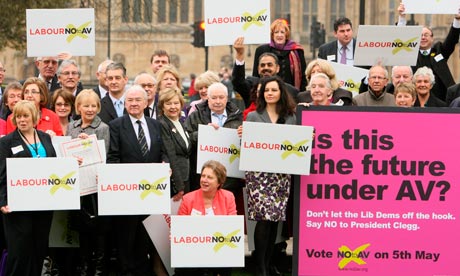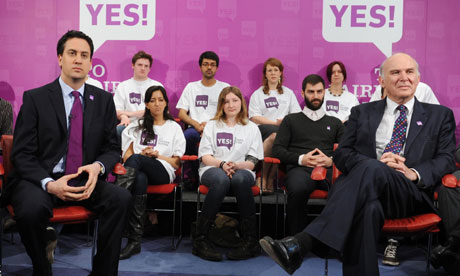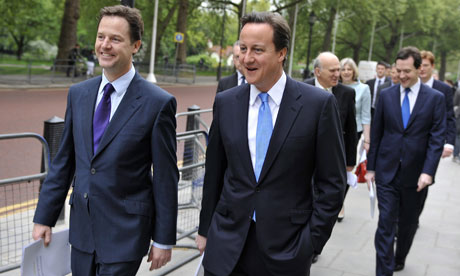
Only the second ever national referendum in British political history is taking place alongside local elections on May 5th. The big question is: Do you want to change the voting system used at general elections from the current First Past the Post (FPTP) method to the Alternative Vote (AV) system?
This referendum on the way we elect our representatives in parliament came about as part of the coalition agreement which formed our current government. The Liberal Democrats wanted to change the way we vote to a Proportional Representation system (PR, where the number of members each party has in parliament is determined by the percentage of people who vote for that party) but the Conservatives were opposed to changing the voting system from FPTP. The compromise was this referendum, not on a change to PR as the Liberals wanted but to the AV which the Liberals see as better than the current system but is not drastically different from FPTP. This is an example of one of the many compromises that the Conservatives and the Liberals made to form a government together.
It is very rare to have a referendum like this in Britain, so as this history making vote creeps closer it’s a good time to examine the two systems on offer:
A NO vote on May 5th will mean sticking with the current voting system, First Past the Post. Under this system everyone in a constituency gets one vote which they place for a candidate, the candidate with the most votes becomes that area’s representative in parliament.
A Yes vote on May 5th will mean changing how we vote in general elections to the Alternative Vote system. Under this system voters can rank the candidates in order of preference, their first preference, second preferences, third preference and so forth depending on how many candidates there are. If no candidate gets over 50% of the first preferences cast then the candidate with the least votes is knocked out. The second preferences, of those who gave the knocked out candidate their first preference, are then added to the other candidate’s totals and count the same as their first preference. If no candidate has 50% of the votes then the process is repeated with the candidate with the least votes being knocked out and their votes going to the next highest preference that their voters indicated. This goes on until one candidate has over 50% of the vote, or there are no more votes that can be distributed.
The debate is being conducted by two cross party groups, ‘NO to AV’ and ‘YES to fairer votes’. The Conservatives and the Liberals are the main forces behind these respective groups. The Labour Party however are split down the middle, many Labour figures are prominent in calling for a NO vote (including former ministers like David Blunkett and John Prescott) but Ed Milliband the party leader supports AV.
The YES campaign has focused mainly on the idea that AV will force candidates to try and gain the support of up to 50% of their constituents in order to win, arguing that this means an end to safe seats and complacent MPs. Much of their advertisement has portrayed MP’s as currently being lazy and deaf to the wishes of the majority of the people they represent. This has upset many Labour MPs who believe that to be unfair and untrue populist propaganda. The YES campaign has also suggested that AV will increase the influence of less popular parties and their supporters on the outcomes of elections. Under the proposed system these supporters would be able to vote for their minor party of choice in the knowledge that they will still be able to affect the outcome through their order of preferences. The YES campaign has in this way gained the support of the Green Party and the UK Independence Party but has also contributed to the comical use of the British National Party in the referendum debate. Both sides have been keen to tar the other with the name of the extremist group and the YES suggestion that fringe parties would have more influence under AV proved to be an opportunity for the NO campaign to do just that; creating maps showing constituencies where BNP supporters’ preferences could determine the result. The Liberal Democrats in the YES campaign hit back by saying that the BNP’s leader Nick Griffin was against a change to AV and therefore on the NO campaign’s side. They neglected to mention that what Nick Griffin actually wants is the same thing as them; Proportional Representation not AV.
The NO campaign has adopted a fairly scattergun approach, firing a lot at the Alternative Vote and seeing what sticks. They have attacked its cost, complexity and obscurity most of all, but have also consistently highlighted the increased probability of further coalition governments under AV and thereby reducing accountability and increasing the likelihood of politicians breaking their election manifesto promises. Another strategy of the NO group has been to highlight the unpopularity of AV, especially amongst those campaigning for it; who would much prefer other systems such as PR. The most over used quote of the NO campaign has been Nick Clegg’s description of AV as ‘a miserable little compromise’. This unfortunate self defeating statement (obviously made before the Liberal leader knew he would soon be campaigning for AV) has contributed to Clegg being remarkably quiet during this referendum that he himself negotiated for. Although this is due more to his unpopularity with large sections of the public after his remarkable rise to messiah of the left and fall to traitor within a month last year.
I will be voting against the Alternative Vote, and the reason is twofold. My first problem is with the negative effect on politics that the introduction of AV would have. For one, in Australia, the only major country to use the system for national elections, AV was introduced for cynical political advantage. Two ideologically similar conservative parties (now often referred to as ‘the coalition’ because they regularly form governments together) introduced the system so they could combine votes to help keep out the opposing centre-left Labor Party. AV is not what the Liberals really want; it’s not fairer or more proportional but they are backing it for their own advantage. I also believe AV would encourage politicians to be more dishonest and vague; it rewards not upsetting anybody and punishes presenting clear honest opinions that some people will disagree with. Whilst a politician being dishonest and vague is obviously nothing new, I feel AV would make this more of a tactical necessity in the pursuit of second preferences from minor parties’ supporters.
Secondly, and most importantly, I disagree profoundly that one voter’s third preference is worth exactly the same as another voter’s first preference. Let alone the absurd idea that someone’s fourth, fifth or even sixth choice should count the same as someone else’s first choice in the final tally. No-one thinks that their own fifth preference is just as important as their first, but this is the assumption of AV. Furthermore the second preferences of the two most popular parties’ supporters will never be counted, this is a reform which specifically targets voters of minor parties and gives them more say in the outcome purely because their first choice happens to be for an unpopular party. This is not equal, this is not fair. First Past the Post is strictly equal; no second choices and no special dispensation to any group. One person, one vote and everyone’s vote counts exactly the same. This is a fundamental of democracy and should be defended.







